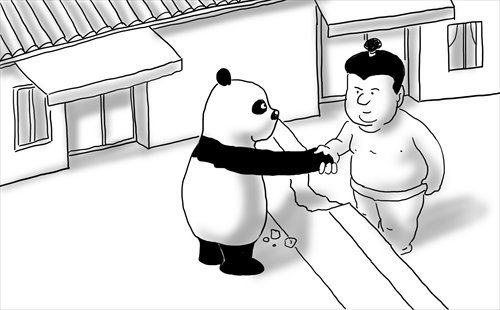HOME >> OP-ED
Can economic bond bring China, Japan closer?
By Ding Gang Source:Global Times Published: 2016-4-27 19:48:02

Illustration: Liu Rui/GT
During my recent visit to Japan, one fact was frequently brought up. The number of Chinese tourists to Japan reached 4.69 million in 2015 and they spent 1.4 trillion yen ($12.6 billion) in this country.
The new aim of the Japanese government is that by the 2020 Olympic Games, Japan can attract 40 million foreigners annually, about a quarter of them Chinese. The expected 10-million Chinese tourists doubles the current figure and will be unprecedented in both Japan's foreign exchanges and its exchanges with China.
The government of Prime Minister Shinzo Abe has been a diplomatic vassal of the US and coordinates with Washington's policy of containing China. But on the other hand, it intends to attract more Chinese tourists. It is not only eyeing economic interests, but also political gains. Tens of millions of Chinese may travel to Japan every year, which will likely change Japan's image in the mind of Chinese people.
Compared with the skyrocketing number of Chinese tourists to Japan, the number of Japanese tourists to China has remained unchanged. The figure for last year stood at 2.6 million, the same as previous two years.
At the same time, the trade volume between China and Japan saw a decline. It decreased to $278.6 billion, almost the same as the trade of $275.8 billion between China and South Korea.
Some Chinese who have been living in Japan for a long time believe that Japanese enterprises' increasingly negative view of China is connected to the Diaoyu Islands disputes. In September 2012, the Japanese government unilaterally announced it would "nationalize" the Diaoyu Islands, which pushed the Sino-Japanese relations to their lowest point in decades and triggered strong protests from the public across China. In Chinese cities such as Changsha and Qingdao, the protests ran out of control and some Chinese protesters even broke and looted Japanese-invested stores and factories.
Although such incidents have passed, the aftereffects linger. They have badly affected Japanese investment in China combined with the rising costs of Chinese labor and the higher threshold for investment. In 2014, Japanese investment in China shrunk by 38.8 percent, followed by another 29 percent the next year.
This is abnormal when we consider the shares of both China and Japan in the global economy, or the complementarities of Chinese and Japanese economies. Among all developed countries, Japan exports the most technologies to China. Many of the technologies in "Made in China" were learnt from Japan.
Where does the hope of advancing China-Japan relations lie? During my recent visit, I found that although many Japanese people hold a negative view toward China, 70 percent of the interviewees acknowledge the importance of bilateral relations.
When Beijing held the military parade on the occasion of the 70th anniversary of the end of WWII and the victory of the Chinese People's War of Resistance against Japanese Aggression in September, China Radio International made a live broadcast with its Japanese counterpart, which received a high click-through rate of 140 million. During this year's two sessions, the live broadcast of Premier Li Keqiang's government work report received 160 million clicks .
When I talked with Japanese media staff, both sides did not avoid controversial issues, and we also came up with possibilities for cooperation. For example, Japan's animation industry is a market worth 1.5 trillion yen, but China offers a much bigger potential market. If China and Japan can join hands, the industry can become a pillar in boosting the economies of both countries.
My Chinese and Japanese fellows all described the other country as neighbors that cannot be escaped, as a result of which the two can only cooperate. China ranks second in the world economy, sitting between the US and Japan. Politically, we can hardly separate the US and Japan. But economically, we should consider how to make the best of Sino-Japanese relations to serve China's development.
The author is a senior editor wwith People's Daily, and currently a senior fellow with the Chongyang Institute for Financial Studies at Renmin University of China. dinggang@globaltimes.com.cn Follow him on Twitter at @dinggangchina
Posted in: Columnists, Viewpoint